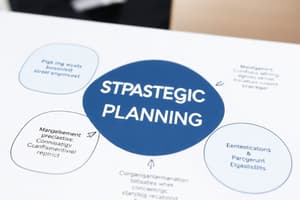Podcast
Questions and Answers
Which managerial skill is primarily used by lower-level managers?
Which managerial skill is primarily used by lower-level managers?
- Technical skills (correct)
- Human relations skills
- Strategic skills
- Conceptual skills
Which type of skills do top-level managers predominantly utilize?
Which type of skills do top-level managers predominantly utilize?
- Technical skills
- Operational skills
- Human relations skills
- Conceptual skills (correct)
Which managerial skill is most crucial for first-level managers?
Which managerial skill is most crucial for first-level managers?
- Financial analysis skills
- Market research skills
- Human relations skills (correct)
- Technical skills
What is a critical guideline for managers during a crisis?
What is a critical guideline for managers during a crisis?
What type of skills facilitate effective management in culturally diverse environments?
What type of skills facilitate effective management in culturally diverse environments?
Which type of plans are needed to revamp a dated publication like Reader's Digest?
Which type of plans are needed to revamp a dated publication like Reader's Digest?
What is defined as a formal document stating an organization's purpose and philosophy?
What is defined as a formal document stating an organization's purpose and philosophy?
What level of management typically deals with the most people?
What level of management typically deals with the most people?
What role involves breaking down the master budget for shift managers?
What role involves breaking down the master budget for shift managers?
Which type of leader involves team members in decision-making but retains ultimate authority?
Which type of leader involves team members in decision-making but retains ultimate authority?
Flashcards are hidden until you start studying
Study Notes
Management Fundamentals
- Management involves organizing, controlling, leadership, and planning. All components are essential to effective management.
Strategic Planning
- Reader's Digest Association needs strategic plans to revamp its magazine's content and attract readership, indicating a shift from traditional to modern approaches in publishing.
Mission Statement
- A mission statement is a formal document outlining an organization's purpose and core philosophy, guiding decisions and strategy.
Levels of Management
- Supervisory management represents the lowest level of management, overseeing the largest number of staff and day-to-day operations.
Middle Management Role
- Middle managers, like plant manager Peter Kwillen, bridge the gap between top management and lower-level managers, breaking down budgets and facilitating communication.
Participative Leadership
- Three types of participative leaders are consensual leaders, democratic leaders, and consultative leaders, all playing important roles in team engagement and decision-making.
Management Functions
- Controlling is crucial for efficiency, as exemplified by Gillette's initiative to enhance inventory management through technology.
Basic Roles of Management
- Management encompasses three basic roles: interpersonal, decisional, and informational, reflecting the diverse responsibilities of managers.
Managerial Skills
- Technical skills are primarily utilized by lower-level managers, conceptual skills by top-level managers, and human relations skills are essential across all levels. All statements regarding managerial skills are accurate.
Crisis Management Guidelines
- During a crisis, effective management includes seeking help when needed. Avoiding press contact and releasing unclear statements can worsen situations, while thorough understanding is essential for resolution.
Management Fundamentals
- Management involves organizing, controlling, leadership, and planning. All components are essential to effective management.
Strategic Planning
- Reader's Digest Association needs strategic plans to revamp its magazine's content and attract readership, indicating a shift from traditional to modern approaches in publishing.
Mission Statement
- A mission statement is a formal document outlining an organization's purpose and core philosophy, guiding decisions and strategy.
Levels of Management
- Supervisory management represents the lowest level of management, overseeing the largest number of staff and day-to-day operations.
Middle Management Role
- Middle managers, like plant manager Peter Kwillen, bridge the gap between top management and lower-level managers, breaking down budgets and facilitating communication.
Participative Leadership
- Three types of participative leaders are consensual leaders, democratic leaders, and consultative leaders, all playing important roles in team engagement and decision-making.
Management Functions
- Controlling is crucial for efficiency, as exemplified by Gillette's initiative to enhance inventory management through technology.
Basic Roles of Management
- Management encompasses three basic roles: interpersonal, decisional, and informational, reflecting the diverse responsibilities of managers.
Managerial Skills
- Technical skills are primarily utilized by lower-level managers, conceptual skills by top-level managers, and human relations skills are essential across all levels. All statements regarding managerial skills are accurate.
Crisis Management Guidelines
- During a crisis, effective management includes seeking help when needed. Avoiding press contact and releasing unclear statements can worsen situations, while thorough understanding is essential for resolution.
Studying That Suits You
Use AI to generate personalized quizzes and flashcards to suit your learning preferences.




